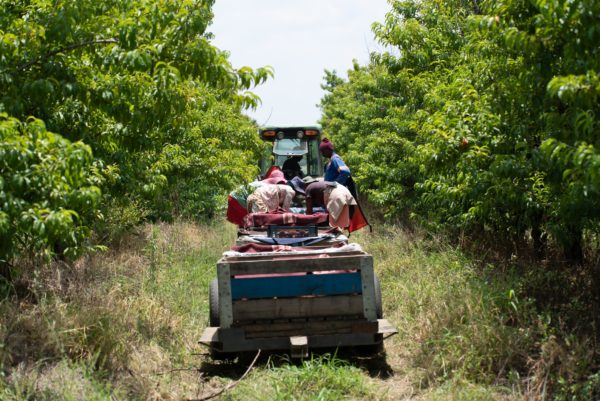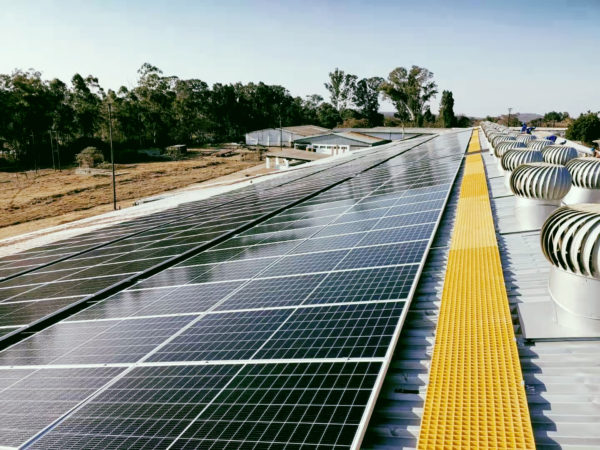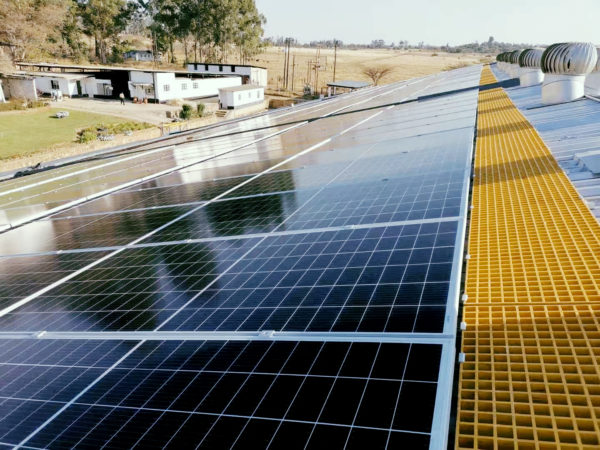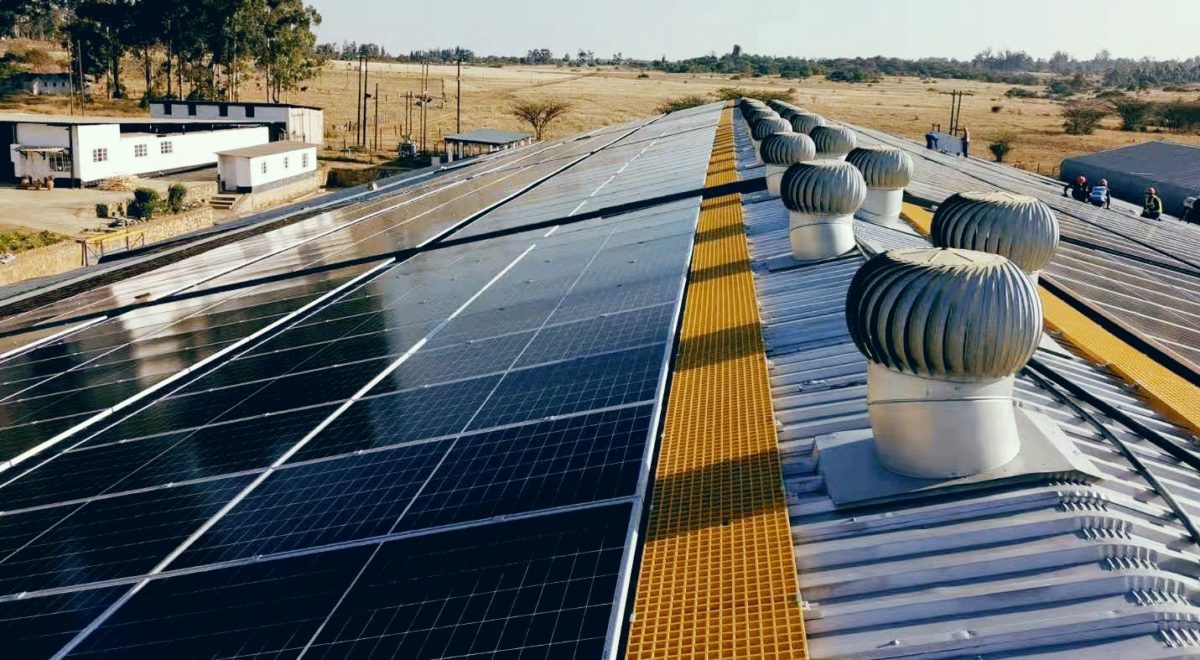pv magazine: Congratulations for having Nhimbe Fresh‘s first phase transformation fully solar-powered. It has been quite the journey. Was the project fully funded by the US$1.4 million crowd sale alone?
Abraham Cambridge: Yes, all our projects are fully funded by crowd sales on our platform. The project has 1,905 [solar] cell owners from all over the world. This is our biggest project, currently. It is a significant project in the solar sector, especially in the sub-Saharan Africa region, and its value is US$1.4 million. We have proven that individuals worldwide want to see such projects happen without relying on big investors to make such projects happen.
AgriPV
pv mag: What challenges have you experienced in this journey, including due to Covid-19 restrictions?
AC: The main challenges with the project were logistics and shipping from China. During the construction phase, the Chinese government banned the export of lithium batteries by ship. We were not able to [import] batteries for quite a period. The solar plant was installed but it could not operate without the batteries since it was designed to be integrated. This caused a delay.
The shipping industry in general was a challenge since the crowd sale ended. After the crowd sale ended, the [Ever Given] ship stuck at the Suez Canal in Egypt caused a backlog of shipping issues, resulting in delays.
However, Zimbabwe has been very open and helpful during the period, despite the challenges. They have administered a good vaccination program with a very high vaccination rate in the country. The installation team has been in Zimbabwe the whole time and a significant number are Zimbabweans.

Image: The Sun Exchange
pv mag: What happens next, after handing over to Nhimbe Fresh? Will you still be on the ground maintaining the project?
AC: Actually, the system is handed over to us, Sunexchange [The Sun Exchange]. The system is currently under synergy; the EPC [engineering, procurement and construction services provider], Sunexchange, will accept the system this [month]. We own and operate the system. Nhimbe Fresh is the tenant, and they will be leasing the system from Sunexchange.
We will, from now on, monitor the system [and] build up maintenance reserves to make sure the system can be looked after in the long term. We will be doing any servicing required, [we will] replace the batteries once they reach their evident life and generally perform all the operations, maintenance, and insurance of the solar plant for its entire lifetime. We will be looking after the plant for the next 20 years.

Image: The Sun Exchange
pv mag: How much should investors expect to make and for how long, and what is the total energy capacity of the project and energy demand for Nhimbe Fresh?
AC: The system is 500kW of PV and 1MWh of battery. The great thing about the battery in place is that solar energy can be used 24 hours a day. For example, when there is load shedding, the solar power plant comes out … if there is no battery. Since the system has a battery installed, solar energy can be used 24 hours a day.
The energy reliability is perfect. This gives a high value to the energy, and the return to the people who own the solar cells in the project is around 13% IRR [internal rate of return] on the U.S. dollar, and those payments are fixed. It's a fixed monthly payment for each solar cell they own. They can earn in Bitcoin or South African rand. The lease is denominated in U.S. dollars and converted into Bitcoin or rand, depending on [the] preference [of investors].
The majority of our payouts are about 60% in Bitcoin and 40% in South African rand. The number of people who choose to earn in Bitcoin keeps increasing as Bitcoin becomes more popular and accepted.
The investors will be earning over the 20-year lease period. After the lease expires, the system is either extended, updated, or decommissioned. Nhimbe Fresh can either take over the system after the 20-year lease period, since it has a 25-year warranty and has some lifetime period left, or we can extend the lease and upgrade the necessary components.
Nhimbe Fresh chairman
pv mag: What made you decide that going solar was the best decision for Nhimbe Fresh?
Edwin Masimba Moyo: The system was made to solve the challenges we had with ZESA [state utility the Zimbabwe Electricity Supply Authority]. We had outages of power which led to production delays, and the quality of our products gets compromised since we are in the cold chain industry.
By going solar, we won't be short of power and we can run all our projects, such as irrigation [and] packaging, and the cold room will be efficient 24/7. We have 20 hectares of blueberries which will be solar powered soon, and our packhouse will also be solar-powered.
Once we go fully solar-powered, and the second phase is completed, we will be able to do about 200 hectares of blueberries, resulting in the employment of about 5,000 jobs between now and 2025. Currently, we are at the first phase, which is the pack house, the second phase will be powering all the firms, which is irrigation.
pv mag: How has productivity improved, or will be expected to improve going forward, due to getting solar-powered?
EMM: We will be able to attract more markets now because we produce our product under the requirement of low carbon emissions. We will be able to quantify how many carbon credits we are creating. We will be attractive in the market because of growing our product using solar. Most supermarket chains will like that because the product is produced under an environmentally friendly situation, looking after the environment, and we are number one in Zimbabwe at the moment!

Image: The Sun Exchange
pv mag: Is there any substantial impact from going solar? How has the reputation and brand of Nhimbe Fresh changed in the community and country as a whole?
EMM: There has been a tremendous improvement. We were [having] to look for US$1.4 million from our own pockets, but Sunexchange came in with an innovative way to fund it. In the province, we have been recognized as the best, and in the country we are the torchbearers. We have received lots of kudos and credibility on running our projects. It is the biggest solar crowd-funded project in Africa.
It has given us lots of publicity, credibility both in government and [with] investors [Cape Town-based financial services group] Old Mutual. We are now leading examples of going solar, growing blueberries using solar, chilling products using solar, and producing all our products from field to packing through solar. It's exciting!
pv mag: What is the pipeline for Nhimbe Fresh into the future?
EMM: Once the project is handed over to Sunexchange, we will move to phase two. In phase two, we will power the pumps and use the irrigation for the farms. The first phase was for the packhouse. To make sure that the packhouse is chilled … farms closer to the packhouse are powered.
We have a 20-hectare global project next to the packhouse and another 10 hectares that will be added, powered by solar. In the first phase, tobacco, pack houses, houses nearby, and labor houses will all be powered by solar. Everything in the first phase is now fully powered by solar.
The Sun Exchange CEO
pv mag: What is next for The Sun Exchange?
AC: The completion of phase one was a massive milestone for Sunexchange. We are now looking into the second phase, which will have a crowd sale this year. We have demonstrated a global appetite for getting involved and making a project like this happen, which benefits job creation, sustainable development, energy security, and clean energy across the continent. We will soon launch a similar project in South Africa with a leading global farm. We are actively exploring opportunities in the rest of the continent with other leading agricultural farms.
pv mag: Is there anything else either of you would like to say?
AC: We have a new American partner platform, known as Energea, joining the Sunexchange funding community. Energea Global, a U.S. renewable energy developer, has access to hundreds of investors in the U.S., bringing in millions of dollars [to] our platform. This has enabled us to increase our ability to fund projects drastically. This year, we target at least 8MW of solar to be funded through this platform. We are now expecting to do bigger projects with more volume.
EMM: We are working with several small-scale farmers to reduce poverty. We have a group of farmers we have linked into the market as out-growers, which is an opportunity for us to expand the solar projects into … remote areas to help them use solar, since they have challenges accessing ZESA and cannot pay the bills. We want to expand this project and include small scale farmers, and we will spread this project across the country.
This content is protected by copyright and may not be reused. If you want to cooperate with us and would like to reuse some of our content, please contact: editors@pv-magazine.com.



1 comment
By submitting this form you agree to pv magazine using your data for the purposes of publishing your comment.
Your personal data will only be disclosed or otherwise transmitted to third parties for the purposes of spam filtering or if this is necessary for technical maintenance of the website. Any other transfer to third parties will not take place unless this is justified on the basis of applicable data protection regulations or if pv magazine is legally obliged to do so.
You may revoke this consent at any time with effect for the future, in which case your personal data will be deleted immediately. Otherwise, your data will be deleted if pv magazine has processed your request or the purpose of data storage is fulfilled.
Further information on data privacy can be found in our Data Protection Policy.